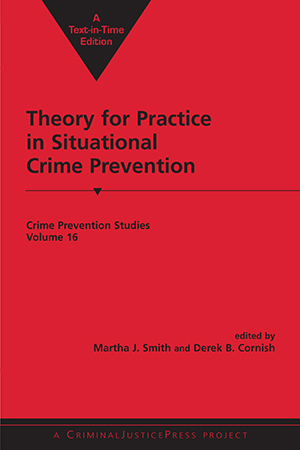
- 2003/289 pages
- Crime Prevention Studies, Volume 16
A CriminalJusticePress Project
Theory for Practice in Situational Crime Prevention
Paperback: $35.00
ISBN: 978-1-881798-44-6
The theme of Volume 16 in the Crime Prevention Studies series is the development and application of theory for use in situational crime prevention. The theoretical perspectives and concepts discussed include the rational choice perspective, environmental criminology, routine activity theory, repeat victimization, problem-oriented policing, the script analytical approach, and displacement. Some of the papers critically analyze these ideas while others apply them to specific crime problems or to situational crime prevention practice.





